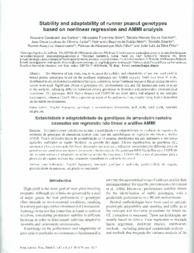Stability and adaptability of runner peanut genotypes based on nonlinear regression and AMMI analysis.
Stability and adaptability of runner peanut genotypes based on nonlinear regression and AMMI analysis.
Author(s): SANTOS, R. C. dos; SILVA, A. F.; GONDIM, T. M. de S.; OLIVEIRA JUNIOR, J. O. L. de; ARAUJO NETO, R. B. de; SAGRILO, E.; VASCONCELOS, R. A. de; MELO FILHO, P. de A.; SILVA FILHO, J. L. da
Summary: The objective of this work was to estimate the stability and adaptability of pod and seed yield in runner peanut genotypes based on the nonlinear regression and AMMI analysis. Yield data from 11 trials, distributed in six environments and three harvests, carried out in the Northeast region of Brazil during the rainy season were used. Signifcant effects of genotypes (G), environments (E), and GE interactions were detected in the analysis, indicating different behaviors among genotypes in favorable and unfavorable environmental conditions. The genotypes BRS Pérola Branca and LViPE‑06 are more stable and adapted to the semiarid environment, whereas LGoPE‑06 is a promising material for pod production, despite being highly dependent on favorable environments.
Publication year: 2012
Types of publication: Journal article
Unit: Embrapa Semi-arid Region
Observation
Some of Embrapa's publications are published as ePub files. To read them, use or download one of the following free software options to your computer or mobile device. Android: Google Play Books; IOS: iBooks; Windows and Linux: Calibre.
Access other publications
Access the Agricultural Research Database (BDPA) to consult Embrapa's full library collection and records.
Visit Embrapa Bookstore to purchase books and other publications sold by Embrapa.

